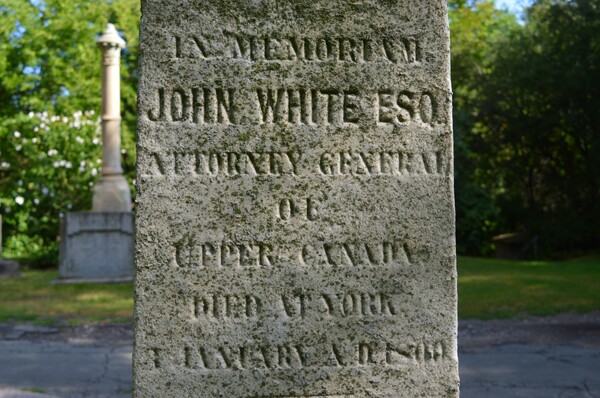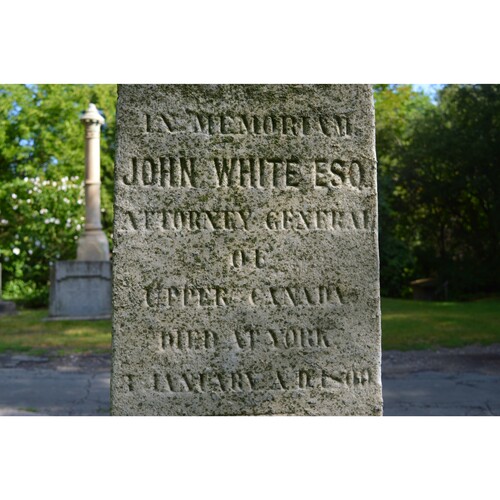
Source: Link
WHITE, JOHN, lawyer and office-holder; b. c. 1761, only son of John White of Hicks’s Hall, parish of St Sepulchre, Middlesex, England; m. 1784 to Marrianne Lynne of Horkesley, Essex, and they had two sons and a daughter; d. 4 Jan. 1800 in York (Toronto).
John White was admitted as a student at the Inner Temple, London, on 17 Oct. 1777. In 1783 his only sister Elizabeth married his fellow student, Samuel Shepherd, who became a distinguished British jurist and throughout his life remained White’s staunch friend and patron. White was called to the bar in 1785 and the following year went to Jamaica, where he practised law without success. In 1791 he was living with his family in Wales, intending to become a clergyman. Shepherd recommended him as a suitable attorney general of Upper Canada to William Osgoode*, who had been selected as chief justice of the new colony. Osgoode passed on the recommendation to Evan Nepean, a commissioner of the Privy Seal, and White was appointed on 31 Dec. 1791.
White sailed for Canada in the spring of 1792 with Osgoode and with Peter* and his sister Elizabeth Russell*, the three of whom remained his closest friends in Canada. After a brief period in Kingston, the government moved in September 1792 to Newark (Niagara-on-the-Lake); White and Osgoode lived together there until White acquired a house the following year. In 1797 he moved to York where Mrs White, from whom he had been estranged, joined him with their children. Their reconciliation was unsuccessful; in 1799 Mrs White returned to England with their daughter.
As the first attorney general of Upper Canada, White was concerned with the adaptation of the laws of Britain to the vastly different conditions of the new colony. There were many problems concerning the ownership of land, especially of land granted before the passage of the Constitutional Act of 1791 and of land transferred by the original grantee before the issuance of his deed. Prosecuting for the crown, White had difficulty getting convictions for murder, even with strong evidence. Because of the absence of jails, petty offenders were punished by fines rather than imprisonment; according to White, these fines were rarely paid:
Like other early attorneys general White carried on a private law practice to supplement his income. Irregularities occasionally resulted. In 1793 Lieutenant Governor Simcoe* was told that White, as attorney general, had prosecuted on an assault and battery charge and had then put up the bail for the defendant, lodged him in his own tent when the sheriff was looking for him, and defended him in the ensuing civil action. Simcoe ignored the complaint, possibly because the defendant was an officer in the Queen’s Rangers.
White was active in the founding of the Law Society of Upper Canada in 1797; as its first treasurer he was also its first president. Alone among the lawyers attending its early meetings he supported the distinction between attorneys and barristers. His objection to combining them was overruled 12 days after his death.
During his stay in Kingston in 1792 White had been elected to the House of Assembly as the member for Leeds and Frontenac. He and the surveyor general, David William Smith*, led the support of government-sponsored legislation in the assembly, including the 1793 bill which provided for the eventual abolition of slavery in the province. White was most concerned personally with the bill establishing the Court of King’s Bench and the district courts in 1794. He was not a member of the second parliament, but in 1799 he contested a by-election in Addington and Ontario. After his defeat his election expenses were paid by the government. In November 1799 he agreed to contest a seat in Lincoln, but he died before the election.
White’s salary as attorney general was £300 a year, supplemented by fees for particular duties, the most important of which was drawing up land deeds. He was seriously in debt to Shepherd when he came to Canada, where he continued to live beyond his means. He constantly sought more highly paid positions and was fiercely resentful of any threatened reduction of his income. A running battle developed among White, the provincial secretary, the surveyor general, the receiver general, the clerk of the Executive Council, and the lieutenant governor, who all shared the fees from the issuance of land deeds. This quarrel deeply divided the officers of government, reduced their efficiency, and caused much bitterness.
White’s first impressions of Upper Canada and Simcoe had been favourable, but he rapidly became disillusioned with the country, Simcoe, many of his colleagues, and his own prospects. As his health deteriorated he grew depressed and irascible. He had apparently had a brief affair with the wife of the clerk of the Executive Council, John Small*. Mrs Small slighted Mrs White at an assembly in York; White made a scurrilous comment about Mrs Small’s virtue to D. W. Smith. Eventually this remark reached Mrs Small, whose husband challenged White to a duel. White was shot, and died 36 hours later. Mrs Small was ostracized, Smith’s appointment to the Legislative Council was postponed indefinitely, and scandal and ill-feeling permeated the insular society of York.
White died heavily in debt. His executor, Peter Russell, sent White’s sons to Shepherd and tried to disentangle his estate. In response to White’s requests, the Duke of Portland, secretary of state for the Home Department, had approved a land grant equivalent to that of an executive councillor; news of his decision reached York after White’s death, and the land was given to his wife and children. White had attempted to make provision for his mistress in York, Mrs Susanna Page, and their two daughters, but nothing was done for them. His estate was not settled until a private bill was passed in 1837.
White was deeply involved in establishing the legal and judicial system of Upper Canada. He had difficulty, however, working with others and is now chiefly remembered for the circumstances of his death.
White’s diary has been published: “The diary of John White, first attorney general of Upper Canada (1791–1800),” ed. William Colgate, OH, XLVII (1955), 147–70.
Metropolitan Toronto Library, John Elmsley letter-book; Elizabeth Russell papers; Peter Russell papers; John Graves Simcoe, Wolford papers; Sir David William Smith papers. PAC, MG 23, HI, 3; 5. PAO, Russell family papers; Simcoe (John Graves) papers. PRO, CO 42/21, f.234, William Osgoode to Evan Nepean, 13 Aug. 1791. “Canadian letters: description of a tour thro’ the provinces of Lower and Upper Canada, in the course of the years 1792 and ‘93,” Canadian Antiquarian and Numismatic Journal (Montreal), 3rd ser., IX (1912), 85–168 (offprint). Correspondence of Lieut. Governor Simcoe (Cruikshank). The correspondence of the Honourable Peter Russell, with allied documents relating to his administration of the government of Upper Canada . . . , ed. E. A. Cruikshank and A. F. Hunter (3v., Toronto, 1932–36). Gentleman’s Magazine, 1760–1800. [E. P. Gwillim (Simcoe)], Mrs. Simcoe’s diary, ed. M. Q. Innis (Toronto and New York, 1965). [F.-A.-F. de] La Rochefoucauld-Liancourt, Voyage dans les États-Unis d’Amérique, fait en 1795, 1796 et 1797 (8v., Paris, [1799]), II, 64. “The probated wills of men prominent in the public affairs of early Upper Canada,” ed. A. F. Hunter, OH, XXIII (1926), 335–36. The town of York, 1793–1815: a collection of documents of early Toronto, ed. E. G. Firth (Toronto, 1962). W. R. Riddell, The bar and the courts of the province of Upper Canada, or Ontario (Toronto, 1928); “The first attorney-general of Upper Canada – John White (1792–1800),” OH, XXIII (1926), 413–33.
Cite This Article
Edith G. Firth, “WHITE, JOHN (d. 1800),” in Dictionary of Canadian Biography, vol. 4, University of Toronto/Université Laval, 2003–, accessed December 31, 2025, https://www.biographi.ca/en/bio/white_john_1800_4E.html.
The citation above shows the format for footnotes and endnotes according to the Chicago manual of style (16th edition). Information to be used in other citation formats:
| Permalink: | https://www.biographi.ca/en/bio/white_john_1800_4E.html |
| Author of Article: | Edith G. Firth |
| Title of Article: | WHITE, JOHN (d. 1800) |
| Publication Name: | Dictionary of Canadian Biography, vol. 4 |
| Publisher: | University of Toronto/Université Laval |
| Year of publication: | 1979 |
| Year of revision: | 1979 |
| Access Date: | December 31, 2025 |



